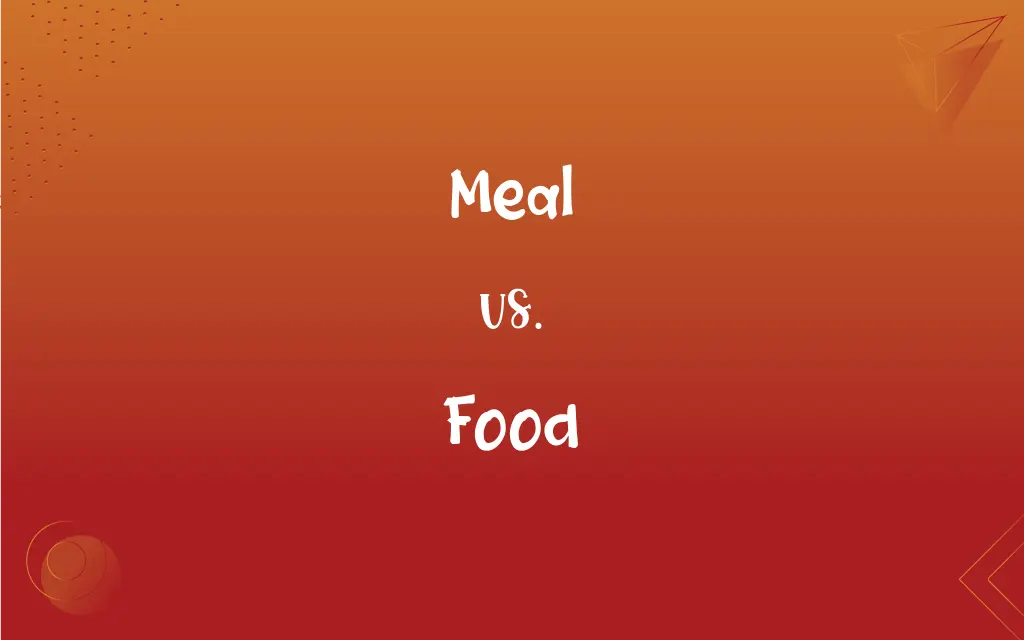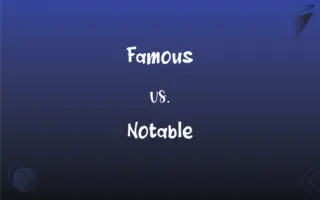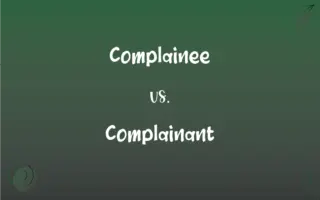Meal vs. Food: What's the Difference?
Edited by Harlon Moss || By Janet White || Updated on October 2, 2023
"Meal" refers to a specific occasion when food is consumed, usually in a structured format. "Food" is a broader term that includes any substance consumed to sustain life and provide energy.

Key Differences
"Meal" and "food" are words often used interchangeably but they have distinct meanings. A "meal" typically refers to an organized instance of eating that could include multiple types of "food," usually served at specific times like breakfast, lunch, or dinner. "Food" is a general term that refers to substances that can be consumed for nutrition and sustenance.
In terms of grammatical roles, both "meal" and "food" are primarily nouns. However, the word "food" can be used more flexibly. For example, "food" can be used as a collective noun to describe a category of items that are edible, whereas "meal" is not used in this collective sense.
When talking about the social or cultural context, "meal" often implies a more organized setting, potentially with multiple courses or a variety of food items. "Food," on the other hand, can be consumed in a variety of settings, from a quick snack on the go to a formal dinner.
Another way to distinguish between "meal" and "food" is to consider their usage in idiomatic expressions. Phrases like "a square meal" or "mealtime" highlight the structured aspect of eating, while expressions like "comfort food" or "food for thought" reflect the broader, more varied applications of the word "food."
In summary, "meal" is a more specific term that often refers to an organized occasion for eating, while "food" is a broader term encompassing any edible substance. Both are essential to human life but serve different roles in language and culture.
ADVERTISEMENT
Comparison Chart
Grammatical Role
Primarily a noun
Primarily a noun but more flexible
Context
Organized eating occasion
Any substance consumed for sustenance
Flexibility
Less flexible, specific
More flexible, general
Social Implications
Implies structure and setting
Can be consumed in various settings
Idiomatic Use
Used in phrases like "a square meal"
Used in phrases like "comfort food"
ADVERTISEMENT
Meal and Food Definitions
Meal
An instance of eating at a specific time.
Breakfast is the most important meal of the day.
Food
Edible items that provide energy.
Carbohydrates are an important source of food energy.
Meal
A ceremonial or social occasion involving food.
The wedding meal was extravagant.
Food
A fundamental requirement for life.
Food and water are basic needs.
Meal
A collection of food items consumed together.
We had a three-course meal for dinner.
Food
Substances consumed for nutrition.
Food provides essential nutrients.
Meal
A structured eating event with multiple courses.
During the meal, we had appetizers, a main course, and dessert.
Food
A category of things that are edible.
Dairy is a type of food.
Meal
A segment of daily routine dedicated to eating.
I usually read the newspaper during my evening meal.
Food
Products that are processed for consumption.
Packaged food often contains preservatives.
Meal
The edible whole or coarsely ground grains of a cereal grass.
Food
Material, especially carbohydrates, fats, and proteins, that an organism uses for energy, growth, and maintaining the processes of life. Plants, algae, and some bacteria make their own food through photosynthesis, while animals and most other organisms obtain food by consuming other organisms or organic matter.
Meal
A granular substance produced by grinding.
Food
A specified kind of nourishment
Breakfast food.
Plant food.
Meal
The food served and eaten in one sitting.
Food
Nourishment eaten in solid form
Food and drink.
Meal
A customary time or occasion of eating food.
Food
Something that nourishes or sustains in a way suggestive of physical nourishment
Food for thought.
Meal
Correct quotes
Food
(uncountable) Any solid substance that can be consumed by living organisms, especially by eating, in order to sustain life.
The innkeeper brought them food and drink.
Meal
Move Middle English to an Middle English (enm) entry
Food
(countable) A foodstuff.
Meal
Possible search real New English citations for obsolete senses}}
Food
Anything that nourishes or sustains.
The man's inspiring speech gave us food for thought.
Mozart and Bach are food for my soul.
Meal
(countable) Food that is prepared and eaten, usually at a specific time, and usually in a comparatively large quantity (as opposed to a snack).
Breakfast is the morning meal, lunch is the noon meal, and dinner, or supper, is the evening meal.
Food
What is fed upon; that which goes to support life by being received within, and assimilated by, the organism of an animal or a plant; nutriment; aliment; especially, what is eaten by animals for nourishment.
Meal
(countable) Food served or eaten as a repast.
Food
Anything that instructs the intellect, excites the feelings, or molds habits of character; that which nourishes.
This may prove food to my displeasure.
In this moment there is life and foodFor future years.
Meal
A break taken by a police officer in order to eat.
Food
To supply with food.
Meal
(obsolete) A time or an occasion.
Food
Any substance that can be metabolized by an organism to give energy and build tissue
Meal
The coarse-ground edible part of various grains often used to feed animals; flour or a coarser blend than flour.
Food
Any solid substance (as opposed to liquid) that is used as a source of nourishment;
Food and drink
Meal
A speck or spot.
Food
Anything that provides mental stimulus for thinking
Meal
A part; a fragment; a portion.
Meal
To yield or be plentiful in meal.
Meal
(transitive) To defile or taint.
Meal
A part; a fragment; a portion.
Meal
The portion of food taken at a particular time for the satisfaction of appetite; the quantity usually taken at one time with the purpose of satisfying hunger; a repast; the act or time of eating a meal; as, the traveler has not eaten a good meal for a week; there was silence during the meal.
What strange fishHath made his meal on thee?
Meal
Grain (esp. maize, rye, or oats) that is coarsely ground and unbolted; also, a kind of flour made from beans, pease, etc.; sometimes, any flour, esp. if coarse.
Meal
Any substance that is coarsely pulverized like meal, but not granulated.
Meal
To sprinkle with, or as with, meal.
Meal
To pulverize; as, mealed powder.
Meal
The food served and eaten at one time
Meal
Any of the occasions for eating food that occur by custom or habit at more or less fixed times
Meal
Coarsely ground foodstuff; especially seeds of various cereal grasses or pulse
FAQs
Can "food" be a drink?
Usually, "food" refers to solids, but it can include liquids meant for sustenance like smoothies.
What does "food" mean?
"Food" refers to any edible substance consumed for sustenance.
Can "meal" be casual?
Yes, a "meal" can be casual or formal, but it's usually structured.
Is all food part of a meal?
No, food can be consumed outside of meal occasions.
What does "meal" mean?
"Meal" refers to a specific occasion of eating, usually structured.
Is "meal" a collective noun?
No, "meal" is not generally used as a collective noun.
Can "food" be unprocessed?
Yes, "food" can be either processed or unprocessed.
Can "meal" refer to a snack?
Generally, "meal" implies a more structured eating occasion than a snack.
Can "food" be eaten at any time?
Yes, "food" can be consumed at any time and in various settings.
Are all meals made of food?
Yes, all meals are composed of food items.
Is "food" a collective noun?
Yes, "food" can be used as a collective noun to describe edible items.
Can "meal" include multiple courses?
Yes, a "meal" can include multiple courses like appetizers, main course, and dessert.
Can "food" refer to a single item?
Yes, "food" can refer to a single edible item like an apple.
Can "meal" have cultural connotations?
Yes, the concept of a "meal" can vary based on cultural norms.
Are the words "meal" and "food" synonymous?
They are often used interchangeably but have different specific meanings.
About Author
Written by
Janet WhiteJanet White has been an esteemed writer and blogger for Difference Wiki. Holding a Master's degree in Science and Medical Journalism from the prestigious Boston University, she has consistently demonstrated her expertise and passion for her field. When she's not immersed in her work, Janet relishes her time exercising, delving into a good book, and cherishing moments with friends and family.
Edited by
Harlon MossHarlon is a seasoned quality moderator and accomplished content writer for Difference Wiki. An alumnus of the prestigious University of California, he earned his degree in Computer Science. Leveraging his academic background, Harlon brings a meticulous and informed perspective to his work, ensuring content accuracy and excellence.































































